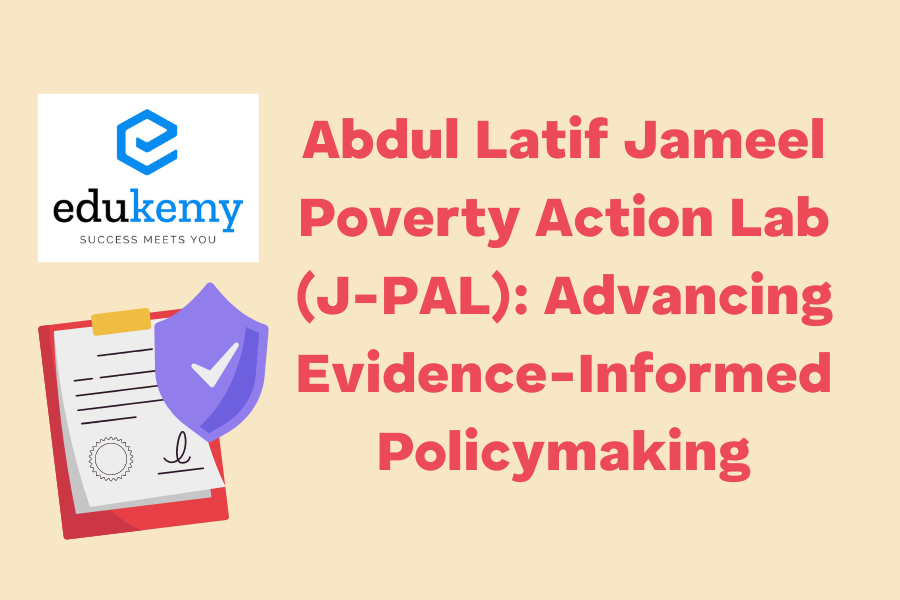
Established in 2003, the Abdul Latif Jameel Poverty Action Lab (J-PAL) stands as a beacon of innovation and rigor in the realm of evidence-informed policymaking. Founded by MIT Professors Abhijit Banerjee and Esther Duflo, alongside economist Sendhil Mullainathan, J-PAL has since evolved into a global research center dedicated to combating poverty through rigorous evaluation and dissemination of impactful interventions. With a mission to reduce poverty by ensuring that policy decisions are based on scientific evidence rather than anecdote or ideology, J-PAL has pioneered randomized evaluations to uncover what truly works in development and social policy. Through partnerships with governments, NGOs, and researchers worldwide, J-PAL continues to catalyze transformative change by translating research findings into scalable, effective solutions for some of the world’s most pressing challenges.
Contents
Abdul Latif Jameel Poverty Action Lab (J-PAL): Advancing Evidence-Informed Policymaking
Mission and Scope:
- J-PAL is a global research center committed to reducing poverty by ensuring that policy decisions are grounded in scientific evidence.
- The lab is anchored by a network of 181 affiliated professors from universities worldwide, who conduct randomized impact evaluations to address crucial questions in the battle against poverty.
Research Approach:
- J-PAL affiliates have been at the forefront of over 800 randomized evaluations, covering diverse topics such as clean water, microfinance, and crime prevention.
- The use of randomized evaluations allows for rigorous and unbiased assessment of the impact of various interventions, contributing to a deeper understanding of effective poverty-alleviation strategies.
Translation of Research into Action:
- J-PAL plays a pivotal role in translating research findings into actionable policies, fostering a culture of evidence-informed policymaking globally.
- The lab’s work extends beyond academic research to bridge the gap between knowledge generation and practical implementation.
Founding and Evolution:
- Established in 2003 as the ‘Poverty Action Lab,’ J-PAL was founded by professors Abhijit Banerjee, Esther Duflo, and Sendhil Mullainathan.
- The initial focus was on supporting randomized evaluations that measured the impact of interventions across various poverty-related domains, including agriculture, health, governance, and education.
Building Partnerships:
- J-PAL actively collaborates with governments, non-governmental organizations (NGOs), donors, and other stakeholders to foster new research, share knowledge, and scale up proven and effective programs.
- These partnerships contribute to the broader goal of influencing policies and practices to effectively combat poverty.
Global Impact:
- J-PAL’s impact extends globally, and its work has implications for shaping policies and interventions across diverse regions and sectors.
- By promoting evidence-informed decision-making, J-PAL aims to drive positive changes in the lives of those affected by poverty.
The Abdul Latif Jameel Poverty Action Lab stands as a prominent institution dedicated to leveraging rigorous research to inform policies that can meaningfully address the multifaceted challenges of poverty worldwide.
FAQs
1. What is J-PAL?
- J-PAL, the Abdul Latif Jameel Poverty Action Lab, is a global research center working to reduce poverty by ensuring that policy decisions are based on scientific evidence. Established in 2003, it is headquartered at the Massachusetts Institute of Technology (MIT) and has regional offices worldwide.
2. How does J-PAL contribute to evidence-informed policymaking?
- J-PAL conducts randomized evaluations to rigorously test and evaluate the effectiveness of social programs and policies aimed at alleviating poverty. By partnering with governments, NGOs, and other organizations, J-PAL helps identify what works, what doesn’t, and why, informing policymakers’ decisions.
3. What types of interventions does J-PAL evaluate?
- J-PAL evaluates a wide range of interventions across sectors such as education, health, finance, agriculture, and governance. These interventions may include cash transfers, educational programs, healthcare delivery methods, microfinance initiatives, and more.
4. How does J-PAL disseminate research findings?
- J-PAL disseminates research findings through various channels, including academic publications, policy briefs, workshops, and conferences. Additionally, J-PAL maintains online resources and platforms to make research accessible to policymakers, practitioners, and the general public.
5. What impact has J-PAL had on policymaking?
- J-PAL’s rigorous evaluations have influenced policy decisions worldwide, leading to the scaling up of effective programs and the redesign or termination of ineffective ones. By promoting evidence-informed policymaking, J-PAL contributes to more efficient allocation of resources and greater impact in poverty alleviation efforts.
In case you still have your doubts, contact us on 9811333901.
For UPSC Prelims Resources, Click here
For Daily Updates and Study Material:
Join our Telegram Channel – Edukemy for IAS
- 1. Learn through Videos – here
- 2. Be Exam Ready by Practicing Daily MCQs – here
- 3. Daily Newsletter – Get all your Current Affairs Covered – here
- 4. Mains Answer Writing Practice – here

